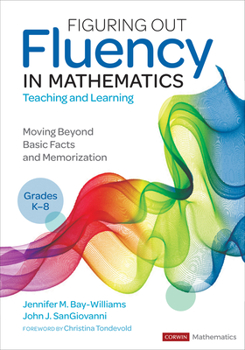Figuring Out Fluency in Mathematics Teaching and Learning, Grades K-8: Moving Beyond Basic Facts and Memorization
Because fluency practice is not a worksheet.
Fluency in mathematics is more than adeptly using basic facts or implementing algorithms. Real fluency involves reasoning and creativity, and it varies by the situation at hand.
Figuring Out Fluency in Mathematics Teaching and Learning offers educators the inspiration to develop a deeper understanding of procedural fluency, along with a plethora of pragmatic tools for shifting classrooms toward a fluency approach. In a friendly and accessible style, this hands-on guide empowers educators to support students in acquiring the repertoire of reasoning strategies necessary to becoming versatile and nimble mathematical thinkers. It includes:
"Seven Significant Strategies" to teach to students as they work toward procedural fluency. Activities, fluency routines, and games that encourage learning the efficiency, flexibility, and accuracy essential to real fluency. Reflection questions, connections to mathematical standards, and techniques for assessing all components of fluency. Suggestions for engaging families in understanding and supporting fluency.Fluency is more than a toolbox of strategies to choose from; it's also a matter of equity and access for all learners. Give your students the knowledge and power to become confident mathematical thinkers.





